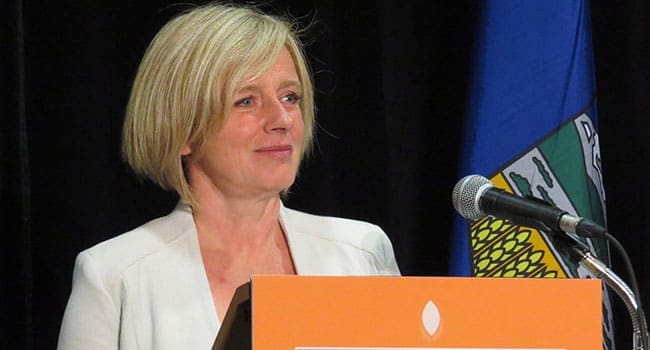By Steve Lafleur
and Hugh McIntyre
The Fraser Institute
In a recent interview, Premier Rachel Notley seemed to hint that the Government of Alberta could slow its plan to increase the minimum wage to $15 if the economy remains weak. The premier’s comments came one day after it was reported that an internal government briefing note stated that a significant job loss as a result of the minimum wage hike is “one realistic possibility,” noting that such a large minimum wage increase puts the province in “uncharted waters.”
The premier’s comments seemed to be an implicit recognition that raising the minimum wage can have negative effects, effectively in a difficult economic environment.
A government spokesperson quickly stepped in to say that the government remains committed to its plan to increase the minimum wage to $15 by 2018. This is unfortunate, because the government’s schedule for more minimum wage increases will do more harm than good for low-income Albertans. The premier should follow her initial comments and re-consider the government’s minimum wage strategy in light of the evidence on the impact of minimum wage increases.
If the government does take another look at the evidence, what they will find is that not only does raising the minimum wage have a negative effect on employment, it’s also an ineffective way to reduce poverty.
First, let’s consider the evidence on how a minimum wage increase effects employment.
The Fraser Institute examined 12 Canadian studies focused on the relationship between minimum wage changes and employment of young workers (between the ages of 15 and 24). Collectively, the studies estimate that a 10 per cent increase in the minimum wage translates into a three per cent to six per cent job loss among this group. This is in line with the overwhelming majority of international research that finds that raising the minimum wage reduces employment. This evidence suggests that the 47 per cent increase planned by the government over the next few years will substantially reduce the employment opportunities available for young and lower-skilled workers in Alberta.
Workers are negatively affected by a minimum wage increase in other ways as well. A higher minimum wage could discourage future job growth, lead to a reduction in the hours employees work and the cutting of non-wage benefits like on-the-job training.
The negative effects associated with minimum wage increases fall disproportionately on young, low-skilled workers. This deprives them of opportunities to gain valuable employment skills that can help them to move up the income ladder. In other words, the minimum wage is most likely to hurt the people that proponents presumably most want to help.
One of the primary motivations for the minimum wage is to help low-income workers by reducing poverty, but the Canadian evidence shows that raising the minimum wage does not have a statistically significant effect on poverty. In fact, one academic study found that raising the minimum wage increased the share of Canadian families falling into relative poverty.
The futility of minimum wage increases in combating poverty makes sense when we understand who actually earns the minimum wage. According to Statistics Canada data, 87.5 per cent minimum wage workers in Canada do not live in low-income households (as defined by LICO). Consider that in 2014, half of all minimum wage workers in Alberta lived with their parents, and most of these people were between 15 and 24 years old and attending school. Of the remaining minimum wage workers, 26 per cent had working spouses.
Statistics Canada data shows roughly only two per cent of minimum wage workers are single parents with young children. Of course, helping increase the purchasing power of these people is a worthwhile policy objective, but there are more efficient targeted approaches to this goal that don’t have adverse employment effects.
Notley’s suggestion the government would revisit the evidence before implementing a 47 per cent minimum wage increase in a shaky economy was a positive sign. Hopefully, despite the about face since then, the premier is serious about taking an evidence-based approach to this important issue. There is too much at stake for Alberta workers to enter the “uncharted waters” of a $15 minimum wage without seriously assessing the potential dangers.
Steve Lafleur and Hugh McIntyre are public policy analysts with the Fraser Institute.
Steve and Hugh are Troy Media Thought Leaders. Why aren’t you?
The views, opinions and positions expressed by columnists and contributors are the author’s alone. They do not inherently or expressly reflect the views, opinions and/or positions of our publication.



